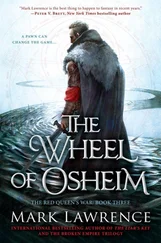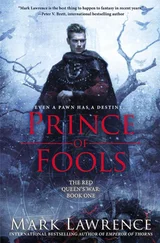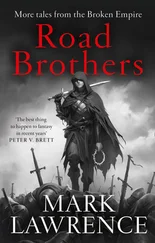Mark Lawrence - King of Thorns
Здесь есть возможность читать онлайн «Mark Lawrence - King of Thorns» — ознакомительный отрывок электронной книги совершенно бесплатно, а после прочтения отрывка купить полную версию. В некоторых случаях можно слушать аудио, скачать через торрент в формате fb2 и присутствует краткое содержание. Жанр: Фэнтези, на английском языке. Описание произведения, (предисловие) а так же отзывы посетителей доступны на портале библиотеки ЛибКат.
- Название:King of Thorns
- Автор:
- Жанр:
- Год:неизвестен
- ISBN:нет данных
- Рейтинг книги:5 / 5. Голосов: 1
-
Избранное:Добавить в избранное
- Отзывы:
-
Ваша оценка:
- 100
- 1
- 2
- 3
- 4
- 5
King of Thorns: краткое содержание, описание и аннотация
Предлагаем к чтению аннотацию, описание, краткое содержание или предисловие (зависит от того, что написал сам автор книги «King of Thorns»). Если вы не нашли необходимую информацию о книге — напишите в комментариях, мы постараемся отыскать её.
King of Thorns — читать онлайн ознакомительный отрывок
Ниже представлен текст книги, разбитый по страницам. Система сохранения места последней прочитанной страницы, позволяет с удобством читать онлайн бесплатно книгу «King of Thorns», без необходимости каждый раз заново искать на чём Вы остановились. Поставьте закладку, и сможете в любой момент перейти на страницу, на которой закончили чтение.
Интервал:
Закладка:
I found the rock pillar in my first year as King of Renar and in all my time on the throne it was perhaps that spare needle of mountain that came closest to killing me. I failed to climb it seven times, and I am not a man who gives up any attempt easily.
Coddin once asked me why I climb and I spun him some pretty lies. The truth-at least for today-is that back when I hadn’t many years on me, my mother would play for William and me on an instrument from the vaults of the tall castle. A piano. A thing of magic and many keys in black and white. We were trouble, Will and I, it has to be said. Fighting, scheming, digging out mischief of any kind that might be had-but when she played we fell silent and just listened. I remember every moment, her long fingers moving on the keys so fast they blurred together, the sway of her body, her hair hanging in a single long plait between her shoulders, the light falling across the wooden body of the instrument. But I can’t hear it. She plays behind glass, walled behind too many years, lost when I walked away from it all, from her, from that damn carriage and the thorns.
I see, but I can’t hear.
When I climb, and only then, on the very edge of everything, I catch stray notes. Like words robbed of meaning on the cusp of hearing…the music almost reaches me. And for that I would dare any height.
I made an eighth assault on the Spire at the start of the summer in which the Prince of Arrow crossed my borders with his armies new laden with loot from conquests in Normardy and Orlanth. Loot and, it must be said, recruits, for the lords of those lands were not well loved and the Prince won the people’s hearts almost before their dead were boxed and buried.
Climbing is about commitment. On the Spire there are places so sheer that one hold must be wholly relinquished before the next can be obtained, and sometimes then only by hurling yourself up an open expanse of rock that offers no purchase. In such moments you are falling, albeit upwards, and if the next hold escapes you then that fall will carry you to the ground. There are no half measures in such ascents: you place everything you are or will be on each decision. Lives can be lived in this manner, but I do not recommend it. In the end though, everybody dies, but not everybody lives-the climber, though he may die young, will have lived.
There comes a point on a long climb when you know you have to surrender or die. There’s no quarter given. I hung to cold stone fifty feet beneath the summit, weak as a child, aching with hunger, blistered hands and feet, arms screaming. The art of survival in the mountains is knowing when to give up. The art of reaching the top is knowing when not to.
“If I die here,” I whispered to the stone. “If I fall and die, I will count it a life lived, maybe not well, but fully. No book will know my end, but I will have died in battle none the less.” And summoning my strength I started to climb again.
Like the Scots king and his famous spider, my eighth attempt proved the charm.
Retching, slobbering on the rock, I crawled over the final corner, horizontal at long last. I lay trembling, gasping, half sobbing, as close to the end of my endurance as I had ever come.
When you’re climbing you take nothing with you that you do not absolutely need. That’s a good discipline to acquire, and the mountains teach it to you for free. They say that time is a great teacher but unfortunately it kills all its pupils. The mountains are also great teachers, and better still, they let the occasional star pupil live.
The mountains teach you to be prepared for change. Amongst the peaks the weather can shift from fair to foul quick as blinking. One moment you might be clambering up a forgiving slope and the next you could be clinging to it as though it were your mother, whilst an east wind tries to carry your frozen corpse off with it.
Climbing God’s Finger I learned a lot about holding on by my fingertips. By the time I finally hauled myself weak and trembling onto the very top of the spire, I had come to realize that I’ve been holding on by my fingertips my entire life.
I flopped to my back. I lay there on the rock with nothing to see between me and a relentless blue sky. I had climbed light, taking nothing unneeded with me, no room on that narrow peak for anyone else, ghosts or otherwise, no Katherine, no William, my mother and father four hundred feet below, too far away to hear. Not even the shadow of a child on the rock or the glimmer of a copper box in memory. It isn’t the danger or the challenge that keeps me climbing, it’s the purity and focus. When you’re a five-second drop from being a smear of guts and pulverized bone, when your whole weight is on eight fingers, then seven, then five, your choices are black and white, made on instinct without baggage.
When you climb hard and reach an impossible peak or ledge, you gain a new perspective, you see the world differently. It’s not just the angle you’re looking from that changes. You change too. They say you can’t go back, and I learned that when I returned to the Tall Castle after four years on the road. I walked the same halls, saw the same people, but I hadn’t gone back; I’d come to a new castle, seen with new eyes. The same is true if you climb high enough, only with climbing you don’t need to stay away for years. Climb a mountain, see the world from its highest point, and a new man will climb down to a world of subtle differences the next day.
Metaphysics aside, there is plenty to be seen from a high point in the mountains. If you sit with your legs dangling over the biggest drop in the world, with the wind streaming your hair behind you, and your shadow falling so far it might never hit the ground…you notice new things.
On the road we have our sayings. “Pax,” we say if we’re caught with our hands in another man’s saddlebags. “Visiting the locals,” we say when a brother is off about dark business after a battle. Where’s Brother Rike? Visiting the locals. In the Renar Highlands there’s a saying that I didn’t hear until I struggled up to the village of Gutting with Sir Makin in tow. “’E was taking a rock for a walk, yer worship.” At the time I paid it no attention, a bit of local colour, a streak of green in the manure. I heard the expression a few more times in the years that followed, generally when somebody was off on mysterious business. Taking a rock for a walk. Once you’ve noticed a phrase or word it starts to crop up everywhere. “Lost his flock,” was another one. I’d hear these things on the parade ground in main, from the local recruits. “That John of Bryn had my bowstrings while I was on wall watch.” “What you gonna do about that?” “Don’t you worry none, already happened. Lost his flock he did.”
Up in a high place, especially one hard-reached, you gain a fresh perspective. Looking out over the peaks and cliffs and slopes I’d come to know, I noticed something new. The shadows gave it away, leading the eye here and there to places where the land didn’t lie quite right. It took a time of empty watching, of idle legs dangling, and thought-stuff swirling behind my eyes before, like the snow in the globe, everything settled and I saw clear, the same scene but with new detail.
High on the sides of almost every valley, of all but the highest gorges, the loose rocks gathered too thickly, perched too precariously. At first the eye buys into the deception. It has to be natural. To move that much stone would take a thousand lifetimes, and to what end?
Taking a rock for a walk turns out to be a genuine national pastime in the Highlands, so deep grained, so known, that nobody seems to feel the need to say more. For generations the men going up to tend their goats have filled any idle moment with the business of carrying loose stones from one part of the slope to another higher part, slowly building up the same piles that their father and grandfather built upon.
Читать дальшеИнтервал:
Закладка:
Похожие книги на «King of Thorns»
Представляем Вашему вниманию похожие книги на «King of Thorns» списком для выбора. Мы отобрали схожую по названию и смыслу литературу в надежде предоставить читателям больше вариантов отыскать новые, интересные, ещё непрочитанные произведения.
Обсуждение, отзывы о книге «King of Thorns» и просто собственные мнения читателей. Оставьте ваши комментарии, напишите, что Вы думаете о произведении, его смысле или главных героях. Укажите что конкретно понравилось, а что нет, и почему Вы так считаете.












